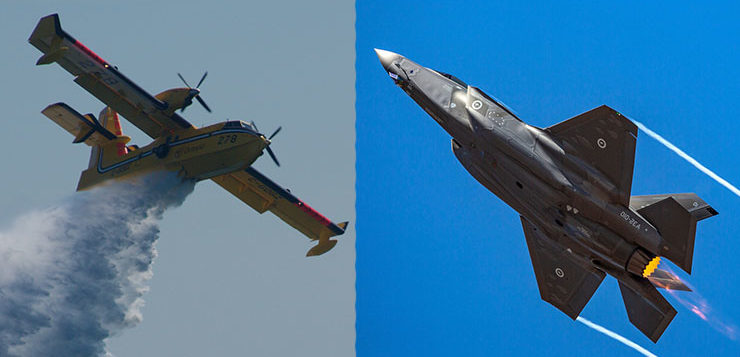DON’T MISS ANYTHING! ONE CLICK TO GET NEW MATILDA DELIVERED DIRECT TO YOUR INBOX, FREE!
Australia’s immediate security concerns have nothing to do with foreign powers and cold wars. Professor Anthony Burke explains the biggest security threats facing Australia right now, and how we can best confront them.
The vast scale, intensity and destructiveness of the 2019-2020 fires represent a major national security crisis for Australia. If a foreign power had used conventional military means to cause such destruction, we would have had a national mobilisation led by our governments and intelligence agencies, rather than the complacency that will no doubt become a future source of national shame.
Record temperatures and speed of fire movement; fires creating their own weather, merging into vast megafires that cannot be contained; thousands of homes and businesses destroyed and barely breathable air in major cities; an area larger than France burned and over a billion animals dead.

This represents a frightening and permanent state of vulnerability that must provoke us to rethink our national security policy and our political values.
For the last 12 years I have concluded my Global Security Masters course at the Australian Defence Force Academy with a week on “strategic shock”. A strategic shock is a major strategic event – such as the global financial crisis, 9/11, or the insurgency in Iraq – that takes governments by surprise but was predicted and should have been prepared for.
Last year, in my Climate and Environmental Security course, I told our students that we were in a situation of slow strategic shock over climate change.
Yet warnings have been available for at least a decade. The 2008 Garnaut Climate Change Review warned that we would have extreme fire seasons by 2020; IPCC assessments have warned since the 1990s that global heating would create longer and more intense forest fires; and extreme fire behaviours have been observable since 2009’s Black Saturday, after which a new level of fire danger – Catastrophic/Code Red – was added to the McArthur Forest Fire Danger Index.
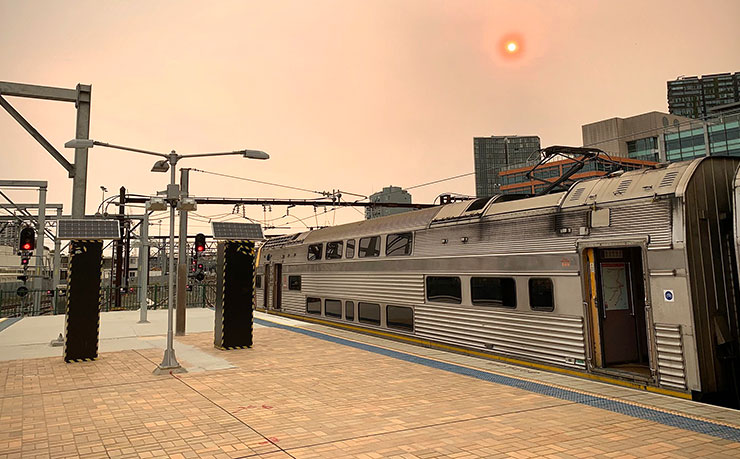
The Bureau of Meteorology tells us that all the years since 2013 have been amongst the 10 warmest on record for Australia, and that in 2019 Australia’s area-averaged mean temperature was 1.52 °C above the 1961–1990 average, and mean maximum temperatures were the warmest on record at 2.09 °C above average.
In short, as the international community aims to keep average global heating to 1.5°C under the Paris Agreement, Australia is living in a two-degree world right now. Given that current emissions trends are pushing us beyond 4°C this century, the prospect of even worse should makes us very afraid.
We were warned
While state fire services were aware of the dangers of this fire season and prepared as well as possible, they have been starved of funds and resources. The Commonwealth ignored appeals to address the situation early.
While in January the Commonwealth and the ADF worked rapidly to mobilise new resources, this should not have had to wait until public outcry made the situation politically untenable.
Especially damning was the report that the Department of Home Affairs warned in its brief to the returning Morrison government in May that “Australians will experience more frequent and severe heatwaves, bushfires, floods, and cyclones” which “will increasingly occur concurrently”. They were ignored in favour of a ridiculous security spectacle of heavily armed police patrolling airports over Christmas.
The tragic human death toll has only been kept down by firm government warnings to evacuate early. Serious problems have emerged with managing evacuations, fuel and food supply, and medical assistance especially in cut off areas. We have too few fire crews, trucks and aircraft.
Those who have lost their homes, businesses and jobs are reliant on a neoliberal state that shows disdain for the poor and the jobless. And we do not have a fire fighting strategy that can protect our wildlife and natural heritage.
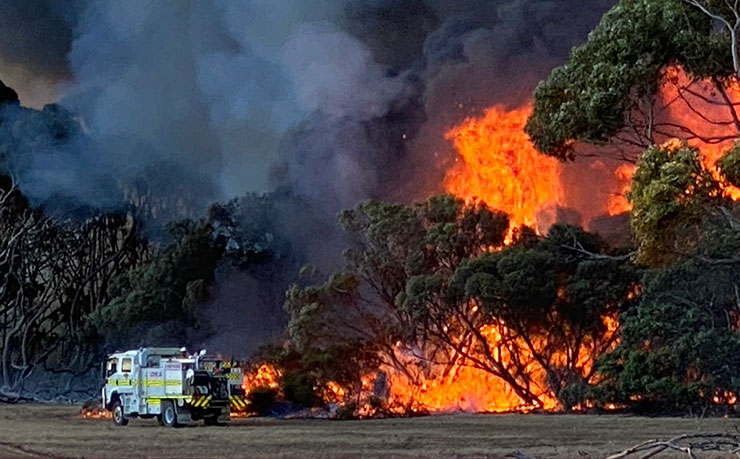
As well as teaching that in the Anthropocene the Earth itself would become a major source of insecurity, I teach that insecurity is produced by our systems. The failure of the Australian government to prepare for these fires cannot solely be put down to a poor leadership culture or a party captured by fossil fuel interests. That surely matters, but it is not the whole story.
Our failure to prepare for these fires is a product of three things:
- the narrow way we think about national security;
- anthropocentric thinking that fails to value how humans are enmeshed in natural ecosystems; and
- four decades in which our system of government has been vandalised by neoliberalism.
Neoliberalism has taken liberalism’s support for private business as the basis of prosperity to a toxic extreme. Rather than merely creating room for the private economy, it seeks to dismantle the state and cripple its ability to provide quality public services – the only exceptions being defence, intelligence and border protection, which have misplaced priorities that fail to address our most urgent sources of insecurity.
It abandons public services to expensive consultants, private charities and volunteer organisations such as our heroic rural fire services.
Such vandalism was exemplified by the Abbott government’s cuts to CSIRO’s climate research and by the major public service restructure announced by the Morrison government late in 2019 – one aimed squarely at further weakening the environment and climate change functions in the Commonwealth.
In an era of increasing social inequality, biodiversity loss and climate change tipping points, neoliberalism is a threat to our national security: it increases our vulnerability and diminishes government’s ability to prevent and respond to major crises.
The way we think about national security – ironically enough – is also a threat. For at least the last 15 years, in major books, in reports for the Lowy Institute, IISS London, ASPI, the Climate Council and in UN Security Council debates, security analysts and public officials have been arguing for a holistic, whole-of-society vision that takes in climate security.
Pacific nations have put climate change at the top of their security concerns. They have all been systemically ignored and underplayed in Washington and Canberra’s national security communities, where security is associated with conventional military threats, counterterrorism, and border protection.
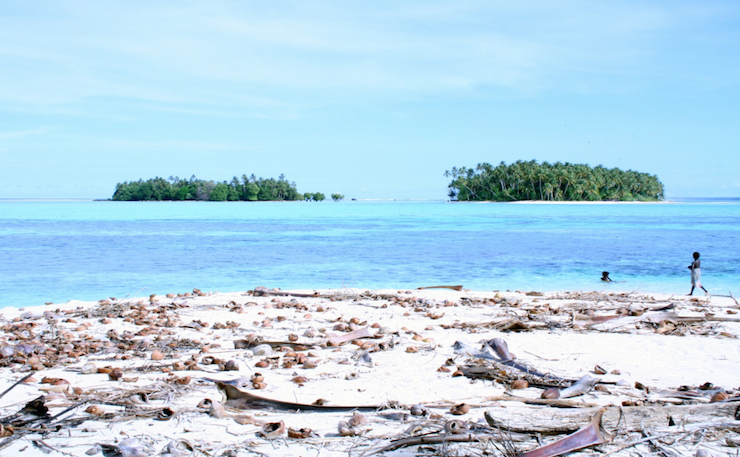
This failure is visible across government and our major academic centres and institutes.
I recall teaching a class at the Australian Command and Staff College in 2008, following the report of the 2020 Summit – the series of community and expert dialogues sponsored by the new Rudd government. Its foreign affairs section urged governments to prioritise human security and address the security implications of climate change.
An officer spoke up: “Where are the hard security issues here?” she asked. Military combat jargon routinely speaks of the “fires” laid down by military weapons, but surely the fires caused by lightning, drought-parched landscapes and overheated winds are similarly devastating?
The Departments of Defence, Foreign Affairs and Emergency Management Australia responded thoughtfully to the 2017 parliamentary inquiry on the national security implications of climate change but were looking anxiously over their shoulders.
The report’s bipartisan recommendations were ignored, and it squibbed the calls of many for Australia to commit to emission reductions consistent with a 1.5°C world.
Defence has valuable assets it can mobilise rapidly, but it does not prioritise Humanitarian and Disaster Relief (HADR) as a strategic mission, and has been slow to integrate climate concerns into its planning, force structure and command.
While soldiers should not be fighting fires, Defence should consult with the states and other Commonwealth agencies to develop more extensive standing capabilities and protocols for domestic HADR. We are too reliant on a few expensive naval platforms and an air force lacking the flexibility to contribute to aerial firefighting.
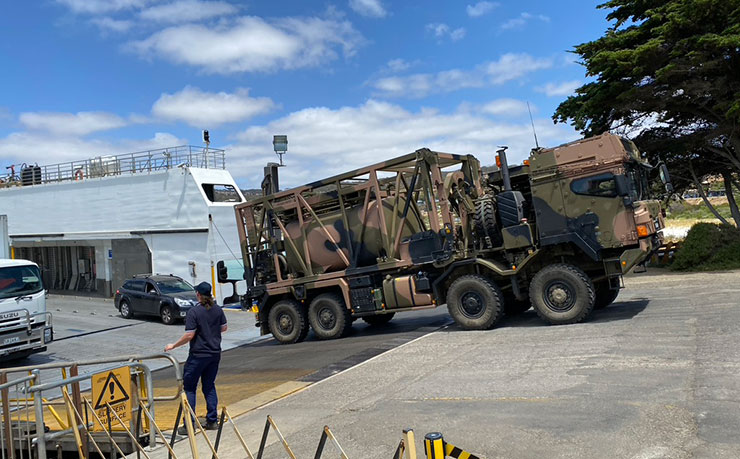
The current ADF contribution is of great value but is not clear that we have the ability to respond to multiple crises concurrently.
State and local rural fire services need a massive boost to funding and resources, and we should be spending hundreds of millions on a large permanent waterbombing fleet using a variety of aircraft.
Valuable proposals to support our firefighters and boost our response capabilities have come from ASPI, the author Jackie French, the Fire and Emergency Chiefs, and Federal Member for Eden-Monaro Mike Kelly.
The third major problem is our national failure to value our rich and vulnerable ecosystems, which have suffered a truly appalling scale of destruction that may put the survival of some species at risk.
Not only have over 10 million hectares and over a billion animal lives been destroyed, but hundreds of millions in ecosystem services to our farmers and cities. This is why many critical scholars have called for an “ecological security” paradigm.
The only way to prevent this destruction is to stop fires spreading as soon as they start. When conditions are bad and resources scarce a triage approach that focuses on protecting human life and property makes sense.
However, if this nation can spend upwards of $17 billion on a strike fighter fleet bought as a hedge against a major power war, we can spend $500 million on a waterbombing fleet to deal with a threat as real and as serious as any this country has faced.
On the worst days this capability may still be inadequate, but it is an investment we must make.
No-one is arguing that we should take our eye off white supremacist and Islamist terrorism, nuclear proliferation or other geostrategic threats. But continuing to downplay and short-change the vast threat to our natural heritage and security represented by fire and climate change would be a national betrayal.
BE PART OF THE SOLUTION: WE NEED YOUR HELP TO KEEP NEW MATILDA ALIVE. Click here to chip in through Paypal, or you can click here to access our GoFundMe campaign.
Donate To New Matilda
New Matilda is a small, independent media outlet. We survive through reader contributions, and never losing a lawsuit. If you got something from this article, giving something back helps us to continue speaking truth to power. Every little bit counts.

